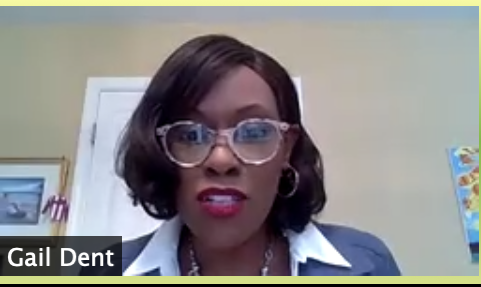Editor’s Note: The headline was corrected to indicate the correct main sponsor of the event.
In honor of National Girls and Women in Sports Day, two prominent female leaders in sports communication came together to educate students on how to achieve their goals and make their mark in the world of sport.
Gail Dent, the associate director of communications for the NCAA, and Marisabel Muñoz, vice president of communications for Major League Soccer who oversees all U.S. Hispanic and international communication and media relations, educated students in a virtual event on the dedication and hard work it takes to land a career in the field of sports communication after college.
Dent and Muñoz understand the value of achieving success by standing out from those around you, and worked tirelessly to land their dream jobs. With internships, volunteer work, and hands-on experience built as the foundation for lasting success, both women know what it takes to stand out from the rest.
In her junior year of college, Dent volunteered at the sports information office at her alma mater, Eastern Kentucky University, and had the opportunity to work directly with student athletes, write for the school newspaper and interact with coaches and media, both local and national.
Muñoz participated in volunteer work as well, and wrote for the newspaper at her alma mater, Florida International University, covering multiple sports ranging from basketball, softball, baseball and soccer. An important takeaway is that both women stressed how important it is to do more than the required college coursework.
“Volunteer as much as you can, even if you’re working for free,” said Muñoz. “It’s getting your foot in the door, showing how hard and committed you are to getting to work and showing your creative skills as well. There is no better selling point for you as a professional. Show your dedication and your commitment even when you are volunteering for free because you never know who is around and who can recommend you.”
With COVID-19 ravaging the sports world this past year, it has been hard to imagine when we will be able to attend a game in the future. But with all this uncertainty has brought the chance to speak on issues that are as equally if not more important, like social injustice.
“It has not been difficult for me being a female African American. I’ve always associated with the diversity and inclusion side,” said Dent. “The difference, I think, in coming along, is there is more discussion about it. That’s the most important thing. That’s what we didn’t have in the past as much.”
“When I had issues coming along in my career, even before my career when I was younger, there wasn’t a lot of discussion around diversity, equity and inclusion,” said Dent. “I think now, the difference is, I find that individuals are having the same issues I had, being the only person at the management table, sometimes the only female and only person of color at the meetings. I think the difference now is the discussion.”
For students who do want to take the route of sports communication as a career, it should be something that they are passionate about for the long-term.
“Try to get into as many volunteer opportunities and internships [as you can] when you are in college,” said Muñoz. “That will tell you if you like it or you hate it. And if you hate it, don’t continue to do it. One thing when you’re working in sports communications, you have to be passionate about it.”
For comments/questions about this story, tweet @TheWhitOnline.

























































































































































!["Working with [Dr. Lynch] is always a learning experience for me. She is a treasure,” said Thomas. - Staff Writer / Kacie Scibilia](https://thewhitonline.com/wp-content/uploads/2025/04/choir-1-1200x694.jpg)









































